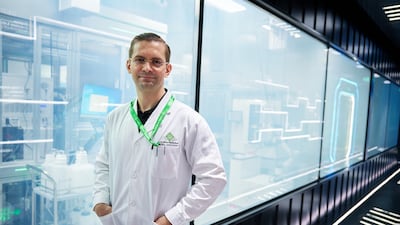The makers of the world’s first phase two AI generated drug said the UAE can be at the heart of a new era in the fight against disease.
The drug discovery process, traditionally known for its complexity and lengthy timelines, is undergoing a significant transformation with the rise of artificial intelligence.
Historically, developing a new drug could take up to 12 years and had a success rate of less than 1 per cent. However, AI is set to change this, enhancing efficiency and reducing costs dramatically.
founder and CEO of Insilico Medicine
“AI provides a way to convert money into drugs,” Alex Zhavoronkov, founder and chief executive of Insilico Medicine, a clinical stage biotech company powered by generative AI, told The National during Abu Dhabi Global Healthcare Week.
“You can have luxury cars and everything but you can't live without drugs. You die without drugs and, in our case, we want to make sure people die late in life."
Cutting costs
Traditional drug discovery is expensive, with estimates ranging from $2 billion to $6.1 billion over 12 years, while the pre-clinical phase alone can cost about $700 million.
In contrast, it is hoped AI-driven approaches can reduce the costs of the pre-clinical stage to approximately $4 million on average, with a worst-case scenario of about $20 million due to lower failure rates.
“There are thousands of diseases that have no cure. We still don’t have a cure for Alzheimer’s or certain cancers,” Mr Zhavoronkov said.
However with AI, not only can more drugs be produced but the aim now is to develop drugs with dual purposes.
"AI can impact drug discovery in three critical stages," he said.
Significant progress
"First, AI aids in understanding the root causes of diseases and identifying the proteins driving these diseases. This process, known as target identification, is crucial for pinpointing which proteins to target for new drug development.
"Second, AI excels in designing small molecule drugs. These molecules are engineered to inhibit or disable the target protein without affecting other proteins in the body, ensuring minimal side effects. Additionally, AI helps design molecules with properties that allow them to survive the digestive system and reach the intended tissues effectively.
"Third, AI optimises the selection of experimental systems and predicts outcomes, reducing time and cost. It also assists in personalised medicine by matching the right drugs to the right patients, increasing the success rates of clinical trials."
Despite the promise of AI in drug discovery, no AI-generated drug has yet reached phase three clinical trials. However, significant progress is being made.
"The integration of AI into drug discovery heralds a new era for the pharmaceutical industry,” he said. "It offers hope for more efficient and cost-effective solutions to combat diseases. As the technology continues to evolve, the potential for significant improvements in global health outcomes remains immense."
The strategy involves leveraging global resources for testing and production while concentrating AI development in geopolitically neutral regions like Abu Dhabi.
"This approach avoids instability seen between major powers like the US and China, ensuring steady progress," said Mr Zhavoronkov.
"For the first time in human history, AI can help convert money into drugs over a seven-year period. The most intelligent way to spend the money is to design locally and outsource globally."












